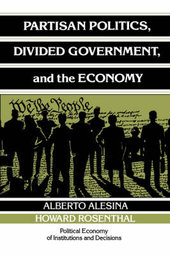
|
Partisan Politics, Divided Government, and the Economy
Paperback / softback
Main Details
| Title |
Partisan Politics, Divided Government, and the Economy
|
| Authors and Contributors |
By (author) Alberto Alesina
|
|
By (author) Howard Rosenthal
|
| Series | Political Economy of Institutions and Decisions |
|---|
| Physical Properties |
| Format:Paperback / softback | | Pages:300 | | Dimensions(mm): Height 228,Width 153 |
|
| ISBN/Barcode |
9780521436205
|
| Classifications | Dewey:320.973 |
|---|
| Audience | | Professional & Vocational | |
|---|
| Illustrations |
Worked examples or Exercises
|
|
Publishing Details |
| Publisher |
Cambridge University Press
|
| Imprint |
Cambridge University Press
|
| Publication Date |
27 January 1995 |
| Publication Country |
United Kingdom
|
Description
This book explores how the political process in the United States influences the economy and how economic conditions influence electoral results. It explains how the interaction between the President and Congress lead to the formulation of macroeconomic policy and how the American voters achieve moderation by balancing the two institutions. Fluctuations in economic growth are shown to depend on the results of elections and, conversely, electoral results to depend on the state of the economy. The final chapter of the book establishes striking similarities between the American political economy and other industrial democracies.
Reviews"...a challenging and important work...in this key area of interdisciplinary research, Alesina and Rosenthal's multi-faceted formal arguments and empirical tests are likely to set the standard for many years." Keith Krehbiel, Stanford University "Alesina and Rosenthal bring together two major themes in the current study of American politics--divided government and the political business cycle. In so doing, they develop a theoretically innovative, statistically well-grounded model of the United States political economy. A strong round of applause is in order." Michael S. Lewis-Beck, Professor, the University of Iowa "Alesina and Rosenthal have made what will surely be an enduring contribution...This book represents a genuine advance in the political business cycle literature...This book is accessible and holds value for both economists and political scientists. It should prove very useful to graduate students, but will also be stimulating to readers who are already familiar with the existing literature on political business cycles. This book would make a nice addition to a graduate seminar on applied political economy; any course which covers political business cycles would be incomplete absent this book as a required text." Jeffrey Milyo, Journal of Politics
|